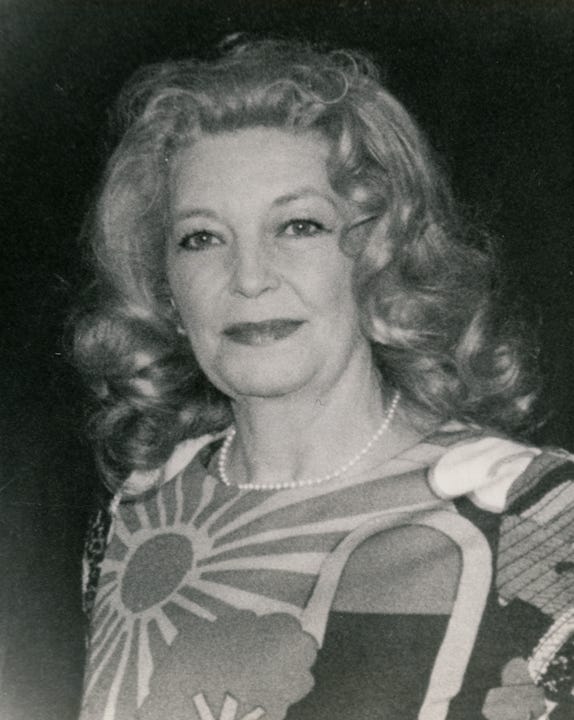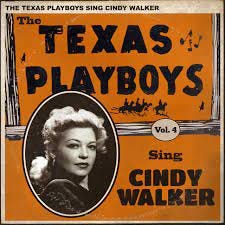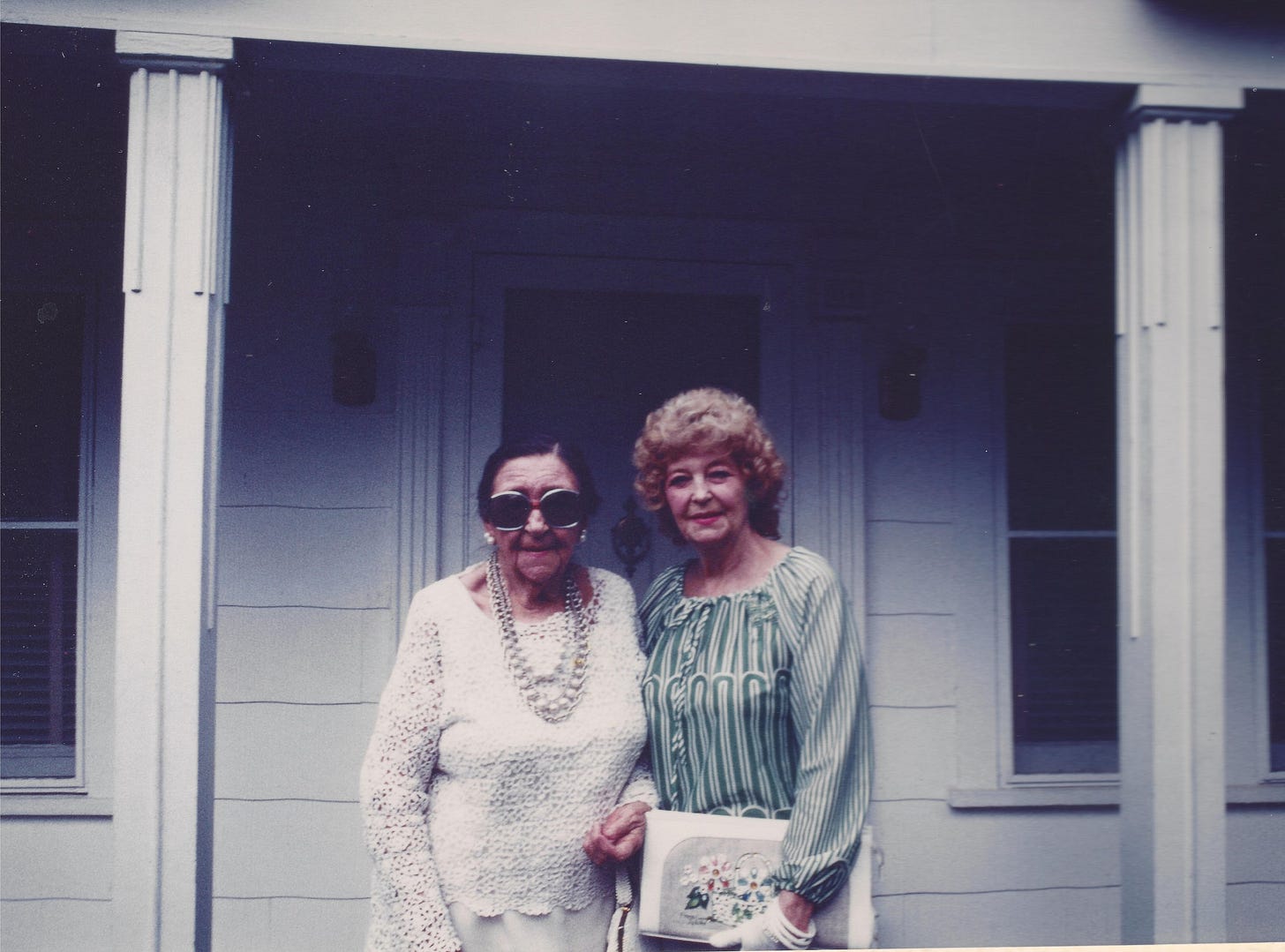Cindy Walker: First Lady of Texas Song
Mexia celebrates its second-most-famous former resident this weekend
Corpus has Selena. Lubbock has Buddy. Corsicana claims Lefty. Turkey has Bob Wills. Oak Cliff has the Vaughan brothers. San Benito put Freddy Fender on its water tower. Texarkana claims Scott Joplin like a lost wallet. Plainview’s top attraction is a Jimmie Dean museum. If a musical giant came from your humble township, you celebrate them for tourists to see.
This weekend is all about Mexia embracing Cindy Walker, who tailor-made Western swing classics for Bob Wills and the Texas Playboys, and got her material onto the charts via Roy Orbison (“Dream Baby”), Jim Reeves (“Distant Drums”), Webb Pierce (“I Don’t Care”), Ray Charles (“You Don’t Know Me”) and George Jones (“The Warm Red Wine.”) Walker’s uncredited co-writer was her mother Oree (the daughter of iconic sacred song composer F.L. Eiland), whose masterful piano playing fleshed-out Cindy’s humming.
Commencing Friday, which would’ve been Walker’s 106th birthday (she lived to 87), the Cindy Walker Days festival boasts two full days of top-flight musical talent, with proceeds going towards the renovation of the Walkers’ longtime home into a museum. Read more about the event and lineup here.
The first woman inducted into the Nashville Songwriters Hall of Fame, Cindy Walker is only the second most famous person from Mexia, right behind Anna Nicole Smith. But where the stripper-turned-national-curiosity painted her fame in gaudy strokes, Walker happily toiled in relative obscurity, with the knowledge that notoriety is fleeting, but great songs live forever.
Walker rarely did interviews, considering them interruptions to her work, but did a phone with me in 2004 when I was writing about an upcoming Austin music tribute to her at the Paramount. Cindy was overwhelmed by the honor, but initially declined to attend, understandable because of her age. Being the center of attention was not her thing. But when her close friends Leon Rausch, Rich O’Brien, Ray Benson and Johnny Gimble signed on, Walker had a change of heart. She ended up getting so into the Paramount gala she made song requests to bandleader Sarah Brown (whose all-star cohorts included Lisa Pankratz on drums, Redd Volkaert on guitar, Earl Poole Ball on piano and Cindy Cashdollar on steel guitar). Organizers offered the 86-year-old legend a private opera box for the show, but she opted for front row, and ended up practically stealing the show by dancing a jig in front of the stage.
That was the woman Orbison’s producer Fred Foster described as “this incredible bundle of talent and energy.” And he discovered Dolly Parton! “Cindy Walker has never written a bad song in her life,” said Foster, who once asked Walker how she could write one of the best drinking songs ever, 1948’s “Bubbles In My Beer,” without having ever stepped inside a honky-tonk. “The imagination is a wonderful thing,” she answered.
When Cindy Walker declined to give her age in 2004, two years before her passing, it seemed less an act of vanity than one of compassion for those who whine of burnout at half the age. Her career as a songwriter lasted 65 years, with her first break coming at age 22, when she accompanied her father, a cotton buyer, and mother, on a business trip to Los Angeles. The headstrong Cindy wasn’t just there to gawk at movie stars and studio lots. She wanted to pitch the songs she’d been writing on her Martin guitar since she was 12. “I saw a building called the Crosby Building,” Walker recalled of a drive down Sunset Boulevard. “I told my daddy to pull over, I wanted to get one of my songs to Bing Crosby, but he just laughed.” Just because it was called the Crosby Building, he said, that didn’t mean it had anything to do with Bing Crosby.
The parents humored their daughter, but then were stunned when she ran outside half an hour later and practically pulled her mother out of the car. It turned out that, indeed, Bing’s brother and manager Larry Crosby had offices in the building, and he just so happened, in that era of Western movies and Zane Grey novels, to be looking for the sort of cowboy songs this feisty gal from Texas wrote.
“I said, ‘Mama, c’mon, you gotta back me up,’” Walker said. “But she said she wouldn’t do it, she wasn’t prepared.” After some cajoling, Cindy’s mom finally relented under the condition that Cindy not tell anyone that Oree was her mother.
Larry Crosby liked “Lone Star Trail” so much he set up a time the next day for Cindy and “older sister” Oree to play it for Bing, who claimed the tune on the spot. “I’m a natural-born song plugger,” Walker said. “I’m not intimidated by anyone. My father didn’t know the music business at all, but he told me to treat it like any other business. Know the market and sell, sell, sell.”
When the Crosbys sent Cindy to record demos of other songs, the head of the Decca label happened to be in the studio, and offered Walker a record deal as an artist. After just two weeks in Los Angeles, Walker had the country’s biggest recording artist cut one of her songs and she had her own record deal. The Walker family decided to stay.
Cindy had a No. 5 hit singing “When My Blue Moon Turns To Gold Again” (which she didn’t write) in 1944 and starred in several “soundies”- three-minute snippets that played between Western double features. But in 1947 she returned to her true calling — songwriting. Besides a gift for simple, evocative lyrics and swaying melodies, Walker had a knack for crafting songs to the strengths of certain artists, like the smooth ballad “Anne Marie” for country crooner Reeves or the wacky “Barstool Cowboy From Old Barstow” for Spike Jones and the City Slickers.
“The label was seeing songs that I wrote for other people become hits and so they’d say, ‘Why didn't you sing that one for us?’ I’d say, ‘Well, I didn’t write that song for me to sing, I wrote it for the one who did it.’” Although Walker had quickly become a favorite writer of such fellow Texpatriates as Tex Ritter, Dale Evans, Al Dexter and Gene Autry, she longed to get songs to Bob Wills and his spectacular band, who were living in Tulsa at the time.
One day Walker was on her way to the corner mailbox to send off a package of songs to Wills when a tour bus with “Bob Wills and the Texas Playboys” emblazoned on the side whizzed by. “I called up just about every hotel in L.A. looking for Bob Wills,” she said. The persistence proved profitable when Walker finally got ahold of Wills’ manager O.W. Mayo, who said to bring her guitar and her best new songs to his hotel. That afternoon, Walker pitched “Cherokee Maiden,” “Dusty Skies” and “Blue Bonnet Lane,” which would all become Wills standards. When Wills and the Playboys were tapped by Columbia Pictures to make eight films, they hired Walker to write songs to go with the plots. She wrote 39 tunes for the Wills movies, and not a single one was turned down.
It never dawned on Walker that, as that rare female hit songwriter, she was bucking tradition. The acts having hits with her material certainly weren’t making gender an issue. “The one thing that everybody in the music business is always looking for is a good song,” she said. “If you could write some, it didn’t matter if you were male, female, orangutan.” Success is a great equalizer. She didn’t let the guys push her around, either. Ernest Tubb wanted to record Walker’s “China Doll,” for instance, but he wanted to change the line “tiny pale hands” to “little brown hands,” but Walker refused. Tubb declined to record the song as is, but it was eventually taken to the pop charts by the Ames Brothers and George Hamilton IV.
“I don’t feel rejected if someone passes on one of my songs,” Walker says. “I just think, ‘Well, it’s not right for them, but it’s right for someone.’”
Although her mother was able to bring elegant accompaniment to Cindy’s songs, Oree was unable to get her Rebecca off Sunnybrook Farm. “Mama was just so prim and proper and I was the opposite,” Walker said, with a laugh. The buoyant, unpretentious Cindy seemed like someone who could’ve settled the West, instead of just writing songs about the new frontier.
“They were quite a mother and daughter team,” said Foster of the Walkers, who stayed at the Continental Apartments on Nashville’s West End for six months out of the year to pitch songs. “They related so well to each other. There was always a lot of banter back and forth when they played. And, oh, how Mama could cook! Her Southern cooking was legendary in Nashville.” Everybody called Oree Walker “Mama,” even those who were older.
So tight were the mother and daughter (Cindy’s father died in 1948) that when Oree Walker passed away in 1991, some friends worried that Cindy, who was married only once and only briefly, would have trouble finding the strength to go on. She still had her songs, though the one who gave them lift was gone. “I miss Mama every day,” she said in 2004. “Every time I sit at the piano, Mama’s grand piano, I remember how she played ‘In the Misty Moonlight’ the day before she died.” Cindy recalled, with a smile you could see over the phone, how she’d get so excited when she finished a song that she’d sometimes wake her mother in the middle of the night to get her to play it. A song was never finished until Mama gave it her touch. “It’ll be just as good in the morning,” Oree Walker would say, then doze on back to sleep.
Until she passed away in 2006 at age 87, Walker never stopped writing songs and pitching them. Her favorite tune was always the one she just wrote.
She bequeathed the home she lived in for 52 years to her longtime housekeeper Willie Mae Adkinson, but after Adkinson’s passing a few years ago, the house fell into disrepair. Fallen shingles were on the once-manicured grounds overgrown with weeds. Coming to the rescue was Lindsay Liepman, a KCEN evening news anchor and 1999 Mexia High graduate who co-directed the 2021 documentary You Don’t Know Me: The Story of Cindy Walker.
Liepman created the Cindy Walker Foundation in April 2022 to buy the house at 114 S. Brooks St. for $30,000 from Adkinson’s family, which had no idea there were treasures among all that junk inside. Assembling a volunteer clean-up crew, Liepman discovered 75 unpublished and unrecorded Cindy Walker songs on reel-to-reel tapes. And in the closet was the dress that was the subject of one of the greatest CMA acceptance speeches of all time, when Cindy Walker read a poem on her induction into the Hall of Fame in 1997.
In the 1980’s my mother bought me a dress for a BMI affair
And she said, ‘When they put you in the Hall of Fame, that’s the dress I want you to wear’
I said, ‘Oh mama, the Hall of Fame. Why, that will never be’
And the years went by, but my mother’s words remained in my memory
And I know tonight she’d be happy, though she’s gone now to her rest
But I think of all that she did for me, and tonight I’m wearing that dress!
Here’s that moment on YouTube. (Get your Kleenex.).
More on the house from Carl Hoover of the Waco Tribune.
Cindy’s Walker’s grandfather F.L. Eiland wrote nearly 300 published hymns.










I read about Cindy in your book, All Over the Map, and enjoyed it very much. First time I became aware of Ms. Walker was the Ray Charles' song, "You Don't Know Me." I thought it was incredible that a gal from Mexia could pen such a heartfelt song. Also interesting is that the Cindy Walker Days celebration will be held at Fort Parker, the home of Cynthia Ann Parker who was abducted by the Comanches and was the mother of Quanah Parker. Another famous female from that little town
wow great history